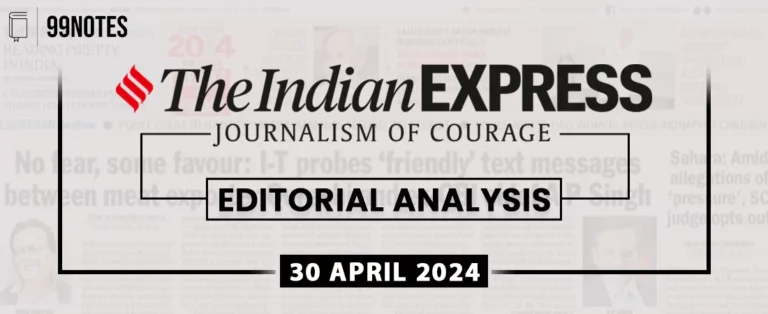21 May 2025 : Indian Express Editorial Analysis
1. Not Just a Trade Deal
(Source: Page 12, The Indian Express)
| Topic: GS2 (International Relations), GS3 (Indian Economy – Trade) |
| Context |
|
FTA Provisions and Significance
-
Covers trade in goods, services, investment protection, and labor mobility.
-
Landmark Double Taxation Avoidance Agreement included.
Strategic Implications
-
Marks a shift in India’s external trade strategy toward deeper economic integration.
-
Enhances India’s credibility as a rule-based trade partner.
Concerns Raised
-
Risks of protectionism, labor standards conflict, and post-Brexit UK’s domestic economic uncertainties.
Conclusion / Way Forward:
- India must balance trade openness with domestic safeguards. FTAs should align with broader economic goals like employment and investment.
| Practice Question: How do FTAs like the India-UK agreement reflect India’s evolving trade strategy in a post-Brexit global order? (GS3 – 250 words – 15 marks) |
2. The Shadow Triangle
(Source: Page 12, The Indian Express)
| Topic: GS2: India and its Neighborhood – Relations
GS3: Security – Internal Security Challenges & External State Actors |
| Context |
|
From Bilateral to Triangular Conflict
-
Traditionally, India’s military standoffs with Pakistan were viewed as bilateral disputes rooted in historical grievances and cross-border terrorism.
-
However, China’s increasing economic and military presence in Pakistan (via CPEC and BRI projects in PoK) has transformed the regional geometry into a “shadow triangle”.
China’s Embedded Role
-
China’s strategic investments in Pakistan’s infrastructure and military, particularly in Gilgit-Baltistan and PoK, have added a third dimension to India-Pak tensions.
-
In any future escalation, India must now factor in the possibility of dual-front coordination between Pakistan and China.
Implications for India’s Strategic Posture
-
Diplomatic Challenge: India must engage global powers like the US, France, and Australia to prevent strategic isolation in South Asia.
-
Defence Modernization: Requires building capacities to handle multi-front scenarios and asymmetric warfare, including hybrid threats.
-
Regional Outreach: India must deepen ties with Afghanistan, Iran, and Central Asia to counterbalance Chinese-Pakistani alignment.
Geopolitical Context
-
The editorial frames this in the backdrop of an evolving multipolar world order.
-
As global institutions weaken, regional alignments are gaining importance — with China acting assertively in South Asia to challenge India’s primacy..
Conclusion / Way Forward:
-
Update India’s military and diplomatic strategy to address multi-front threats from China and Pakistan.
- Strengthen partnerships with QUAD and regional allies for strategic leverage.
-
Enhance border infrastructure and intelligence coordination across both western and eastern sectors.
-
Leverage multilateral platforms to highlight violations of sovereignty in PoK by China.
- Focus on deterrence without escalation through calibrated diplomacy and readiness.
| Practice Question: With China’s embedded role in Pakistan, India’s traditional security calculus in South Asia has shifted. Discuss how this strategic triangle alters India’s regional security framework and what should be India’s response. (GS3 – 250 words – 15 marks) |
Read more – 20 May 2025 : Indian Express Editorial Analysis


